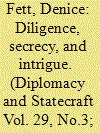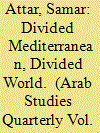| Srl | Item |
| 1 |
ID:
161003


|
|
|
|
|
| Summary/Abstract |
The traditional description of the 1559 Treaty of Cateau-Cambrésis that marked the end of the Italian Wars is that it was the logical culmination of a generation’s worth of warfare. However, this interpretation dismisses the fact that most contemporaries feared that the 1558–1559 negotiations could produce no peace more permanent than other recent treaties between the Spanish Hapsburgs and French Valois, and that the actual process of negotiation happened along several parallel channels. In particular, the new English government under Queen Elizabeth I used the negotiations, and the services of an unofficial diplomatic agent, to explore the possible terms of peace and to begin establishing relations with both France and Spain.
|
|
|
|
|
|
|
|
|
|
|
|
|
|
|
|
| 2 |
ID:
161899


|
|
|
|
|
| Summary/Abstract |
Divided Mediterranean, Divided World: The Influence of Arabic on Medieval Italian Poetry describes the significant role played by Arabic and Islamic poetry, legends, tales, and philosophy on major Italian poets in the Middle Ages in spite of the denial of some of the poets themselves of such an influence. Psychologists do not seem to pay much attention to the love–hate syndrome that affects sensitive souls in politically unstable states. Similarly, many literary critics continue to turn a blind eye to the influence of Arabic on Medieval Italian poetry. Historians also present history to us not only through documents they have read in archives, but they similarly express their own divergent personal opinions and interpretations of historical events.
|
|
|
|
|
|
|
|
|
|
|
|
|
|
|
|